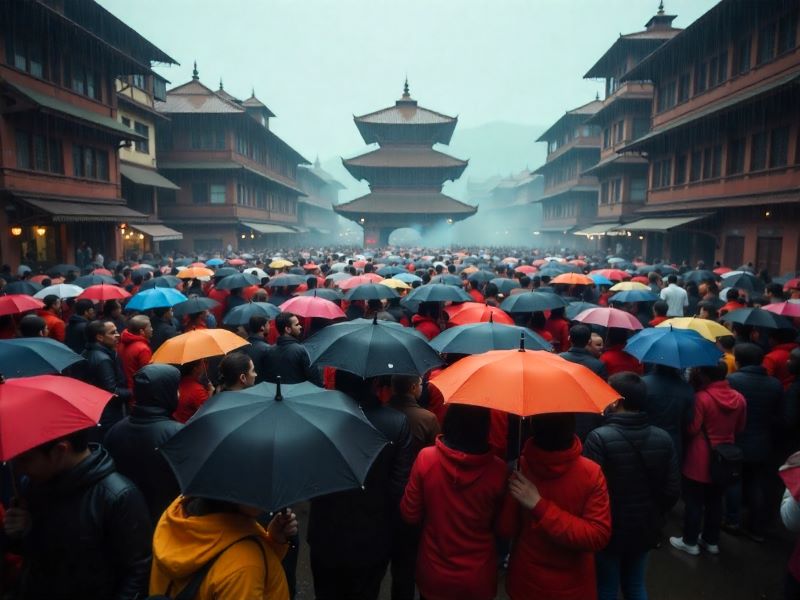Published on
September 10, 2025

The Israel travel warning has been issued due to escalating protests and violent unrest in Nepal. Protests, primarily centered in Kathmandu and other major cities, have led to serious disturbances, including casualties, widespread property damage, and the closure of the Kathmandu airport. The Israel Foreign Ministry has advised its citizens to avoid traveling to Nepal at this time due to the dangerous conditions, urging those already in the country to exercise caution and remain indoors until the situation improves.
Background on the Protests
The Nepal protests are fueled by widespread discontent over various issues, such as the government’s controversial social media ban and growing concerns over corruption within the Nepali government. These protests, initially sparked by the restriction of online freedoms, quickly escalated into larger demonstrations that spread across major urban areas like Kathmandu. As the protests gained momentum, they became more violent, culminating in dramatic actions such as storming and setting fire to Nepal’s parliament building.
The social media ban, implemented by the government, further fueled public outrage, with many seeing it as an attempt to suppress free speech and limit citizens’ ability to communicate openly. This action, alongside accusations of widespread corruption within the Nepali government, led to the resignation of Prime Minister KP Sharma Oli. These events have marked a critical moment in Nepal’s political history, with unrest continuing in various parts of the country.
Israel Foreign Ministry Issues Travel Advisory
In light of the violent protests, the Israel Foreign Ministry has issued a clear travel warning for Nepal, advising its citizens to avoid traveling to the country due to the unsafe environment. The warning highlights the ongoing security concerns and the possibility of further escalations in the Kathmandu unrest. Israeli nationals have been strongly urged to stay away from large crowds and public demonstrations, especially in areas where protests are most intense.
The travel warning stresses that the situation in Nepal is volatile, with violent clashes between security forces and protesters. At least 22 individuals have lost their lives in the ongoing violence, and over 200 have been injured. The protests have disrupted normal life, with road blockages and curfews being enforced across major cities like Kathmandu. As a result, many foreigners, including Israelis, have been left stranded as flights are canceled and transportation is halted.
Impact of Protests on Nepal’s Infrastructure
The Nepal protests have had a significant impact on the country’s infrastructure, particularly in the capital, Kathmandu. Major roads have been blocked by demonstrators, and businesses have been forced to close in many areas. The destruction of property, including government buildings and private homes, has caused widespread economic disruption. The closure of Kathmandu’s airport has further exacerbated the situation, making it difficult for both locals and foreigners to travel in and out of Nepal.
As a result of the unrest, the Nepali government has imposed curfews in an attempt to restore order, but these measures have been largely ineffective in preventing the spread of violence. While some areas have seen a temporary calm, the overall situation remains unstable, and it is unclear when peace will be restored.
Political Fallout and Government Response
The political fallout from the protests has been significant, with many calling for reform within the Nepali government. The resignation of Prime Minister KP Sharma Oli, forced by the growing pressure from the demonstrators, marks a major shift in Nepal’s political landscape. However, the resignation has not led to an immediate resolution of the issues that sparked the unrest.
The government’s handling of the protests, particularly its use of force against demonstrators, has been widely criticized. The decision to implement the social media ban, in particular, has drawn harsh criticism from the public and activists, who view it as an attempt to stifle free expression and limit democratic rights. These actions have only fueled the anger of the protesters, making it clear that the Nepali government faces a deep crisis in terms of both legitimacy and public trust.
Israel’s Ongoing Travel Warning for Nepal
As the situation in Nepal continues to deteriorate, the Israel Foreign Ministry’s travel warning remains in place. Israeli citizens are urged to refrain from traveling to Nepal, and those already in the country are advised to follow all local instructions and avoid areas where protests are occurring. Given the unpredictable nature of the unrest, it is crucial for Israeli nationals to stay informed and prioritize their safety by avoiding confrontational situations and adhering to curfew measures.
The ongoing unrest in Kathmandu and beyond has left many feeling uncertain about the future of Nepal. The combination of political instability, public dissatisfaction, and violent protests presents a serious challenge for the country’s leaders, and it is unclear when normalcy will return. For now, the Israel travel warning serves as a critical reminder to all travelers to stay cautious and avoid visiting Nepal until the security situation improves.
Conclusion: A Time for Caution and Awareness
In conclusion, the Israel travel warning for Nepal reflects the growing concerns over the escalating protests and violence across the country. As the situation remains fluid, it is essential for Israeli nationals to stay updated on the latest developments and avoid traveling to Nepal until the unrest subsides. While the resignation of the prime minister signals political change, the underlying issues that sparked the protests remain unresolved. The combination of government censorship, corruption, and violent public demonstrations continues to create a dangerous environment for both citizens and visitors. The ongoing Kathmandu unrest serves as a stark reminder of the importance of heeding official travel warnings and prioritizing safety in uncertain times.







